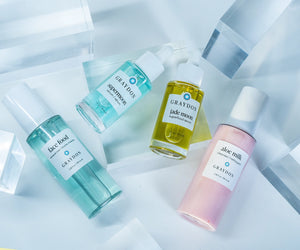We know that pollution has an effect on your respiratory and cardiac health, but do you know that it can affect your skin too? With all the airborne pollution constantly being emitted (whether you see it or not) there’s no question that living in a big city like Toronto can affect your skin.
This results in your skin’s natural oil absorbing the pollution, thus clogging up your pores. Plus, as the day goes on, these pollutants can get buried deeper in your pores, resulting in premature aging and wrinkles. The need to protect your skin from environmental pollution is more important than ever, and the right skin care is the way to do it.
Environmental Pollutants
We know that air pollution is worse in big cities, but living in rural areas doesn’t mean you’re safe either.

Pollution travels through the atmosphere, water, and can settle in soil, so no matter where you are, pollution follows. There are five types of pollution that can pose the biggest risk to your skin:
- Car and truck exhaust
- Cigarette smoke
- Manufacturing by-products
- Small particle matter
- Smog
While all of these cause damage to the skin, smog, in particular, is the most harmful one. It’s a silent killer that attacks our respiratory, circulatory and cardiac health. But, it also attacks our skin. Its particles stay on your skin and trap the bacteria inside your pores, thus creating the perfect environment for acne.
Alongside acne, according to this scientific article, pollution is associated with these skin issues:
- photoaging (this is premature skin aging caused by UV rays)
- liver spots
- melasma
- dermatitis and eczema
- skin barrier dysfunction
- psoriasis
How To Protect Your Skin
As stated previously, pollution can result in premature aging and wrinkles. But, it may also lead to dehydration, skin barrier damage, disruption of the skin microbiome, and even skin cancer. Oftentimes it can also worsen existing skin conditions like acne, eczema and more. In a perfect world, the most effective way to protect your skin is to reduce pollution in its totality, but that may be years away. So, some immediate actions include monitoring the air quality and using skincare products with antioxidants.
Cleanse your skin
Cleansing is always the first step of a skincare routine, and having a cleanser filled with antioxidants and vitamins will help protect you! Vitamins like C, E, and B3 are known to reduce the pollution effect on the skin.
The need to protect your skin from environmental pollution is more important than ever, and the right skin care is the way to do it.
That’s why when you’re considering one, our Aloe Milk cleanser is perfect. Not only does it contain Vitamin E and B3, it has antioxidant-rich polyphenols and caffeine from black tea to help reduce the look of fine lines and wrinkles. Cleansers need time to work on the skin, so when you’re applying it you want to massage the cleanser for 30-60 seconds at least, in order to get all the great benefits.
Serums
Serums, especially with antioxidants, are a great way to protect your skin.

Antioxidants help defend the skin against oxidative stress, which can be brought on by a number of things like inflammation, UV damage, and of course pollution (in fact, pollution is a huge culprit behind oxidative stress!). When your skin isn't defended against damage, it can cause a dull and uneven look.
That's where serums come in. They're a great way to make sure you're getting that antioxidant protection (on top of all the benefits individual antioxidants like vitamin c, niacinamide, and peptides offer).
When it comes to tackling pollution, Supermoon Serum has an incredible anti-pollution complex in it's formula. We even won an award for it when The Beauty Shortlist named Supermoon their winner for "Best Anti-Pollution Skincare". It’s filled with Vitamin C, and Malachite which will help shield your skin against everyday pollutants. Plus, the moringa extract defends your skin barrier by reducing particle adhesion and purifying the skin.
Hydration
The last step to any great skincare routine is a moisturizer, specifically a hydrating one. Phyto Clear is the ultimate moisturizer that fits the criteria to a T!

With ingredients like chlorella and broccoli seed oil, it helps shield your skin from free radical damage and environmental pollution. Plus, it has great tonifying ingredients like parsley, sage, rosemary, and thyme which helps clarify your face.
Sunscreen
Sun damage is also classified as a pollutant. So, It’s important to get in the habit of applying SPF daily. It should always be in your morning routine as the last step (before makeup) , that way if you need to head out, you won’t be forgetting it! No matter if there’s clouds in the sky or rain coming down, the sun, just like our everyday pollution, is always there. Here are some quick sunscreen tips that may help you:
- Apply 30 minutes before sun exposure
- Carry sunscreen wherever you go & reapply every two hours
- SPF 30 or higher always!
- To know how much to apply on the face and neck, dispense sunscreen using the two finger method, by directly applying sunscreen from the base of your index and middle finger to the tip.
- Apply sunscreen on the places that you will get the most sun on that day! But ALWAYS apply it on your face, neck, and hands.
It’s a challenge to escape pollution. We know that a lot of people are trying to do their part to stop it, but it’s not enough... at least for right now. But living in big cities doesn’t mean that our skin needs to suffer either. So while we unfortunately can’t stop pollution altogether, we can find ways to stop the damage it’s causing to our bodies!
Wishing you happy, healthy, pollution-free skin! Keep scrolling to shop our bestselling Supermoon Serum below!
--

Whether you're from a city or a small town, everyone deserves to feel good about the skincare they buy.
At Graydon, you can be confident you're supporting a brand that values plant-powered, sustainable, and effective skincare.
Phytogreen is our way of showing that we're dedicated to harnessing the best of eco-friendly biotechnology to create products that are good for you + good for the environment.



